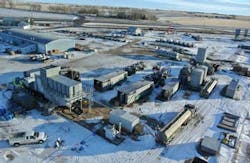General Electric Company (GE) is set to invest billions in improving U.S. fracking operations, to make the technique safer and more efficient on the one hand, while on the other to further develop shale gas and oil production, the company has announced.
According to Fox News, GE is opening a new laboratory in Oklahoma that will facilitate advancement in drilling operations. It believes that its efforts could mitigate the effects from fracking on the environment and could bring about innovative technology that would increase profit for clients. Mark Little, senior vice president of GE, stated that while GE did little in oil and gas about a decade ago, over the past few years it has invested over $15 billion in the industry. Oil and gas resources would be necessary for many years to come, so ensuring they are wisely and effectively used is of critical importance, he explained.
Although GE does not produce oil or gas, nor does it drill wells, various aspects of the booming fracking industry have contributed positively to GE's business. Horizontal drilling of wells is taking place at various depths in different formations across a number of locations, which suggests the need for a variety of techniques.
Fracking operations also vary in terms of public response, as in certain states like Oklahoma there has been very little opposition to drilling, while in others, including Pennsylvania and Colorado, the public outcry has been quite loud. Little believes that those reactions could be soothed by proper management of drilling operations. As a parallel, he noted that decades ago the aircraft industry was seen as a risky business, but thanks to the commitment of the industry it has developed into a safe and highly efficient means of transport. Just as GE aims to improve oil and gas operations, it also puts an emphasis on wind energy, solar and nuclear power, as the world needs such systems, Little pointed out.
RELATED: Obama administration proposes new rules for fracking operations
Most people would agree that the public needs to see that continual and systematic efforts are being made to improve technologies, used both in generating clean energy and in the production of oil and gas through drilling. To facilitate this, Little believes that minds and machines should be put together. For instance, GE has developed equipment that can be put in a well to send information to people on the surface about what is taking place a mile or more down the well. Thanks to technology, the industry now has more information than ever before and this information should be put to use to increase efficiency and to reduce environmental impacts, Little said.
While GE's approach makes sense from a purely technical standpoint, it is not likely that it would resolve the problem of how society sees fracking, according to Neil Donahue, a professor of Engineering and Public Policy at Carnegie Mellon University in Pittsburgh. He commented that there were various aspects of the issue, including which communities accept fracking and which reject the concept, and fracking should be discussed at other levels.

